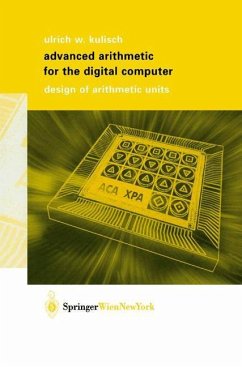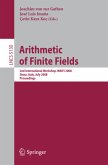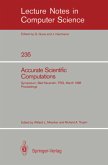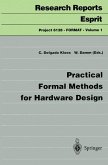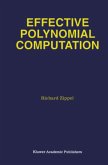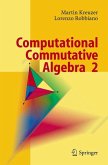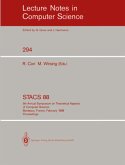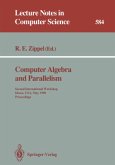The book deals with computer arithmetic in a more general sense than usual. Advanced computer arithmetic requires that all computer approximations of arithmetic operations - in particular those in the usual vector and matrix spaces - differ from the correct result by at most one rounding. The implementation of advanced computer arithmetic by fast hardware is examined in the book. The new expanded computational capability is gained at modest cost. It increases both the speed of a computation and the accuracy of the computed result. With it fast multiple precision arithmetic can be easily provided. All this strongly supports the case for implementing advanced computer arithmetic on every CPU.
The book also shows that on superscalar processors interval operations can be made as fast as simple floating-point operations with only very modest additional hardware costs.
The number one requirement for computer arithmetic has always been speed. It is the main force that drives the technology. With increased speed larger problems can be attempted. To gain speed, advanced processors and pro gramming languages offer, for instance, compound arithmetic operations like matmul and dotproduct. But there is another side to the computational coin - the accuracy and reliability of the computed result. Progress on this side is very important, if not essential. Compound arithmetic operations, for instance, should always deliver a correct result. The user should not be obliged to perform an error analysis every time a compound arithmetic operation, implemented by the hardware manufacturer or in the programming language, is employed. This treatise deals with computer arithmetic in a more general sense than usual. Advanced computer arithmetic extends the accuracy of the elementary floating-point operations, for instance, as defined by the IEEE arithmetic standard, to all operations in the usual product spaces of computation: the complex numbers, the real and complex intervals, and the real and complex vectors and matrices and their interval counterparts. The implementation of advanced computer arithmetic by fast hardware is examined in this book. Arithmetic units for its elementary components are described. It is shown that the requirements for speed and for reliability do not conflict with each other. Advanced computer arithmetic is superior to other arithmetic with respect to accuracy, costs, and speed.
Hinweis: Dieser Artikel kann nur an eine deutsche Lieferadresse ausgeliefert werden.
The book also shows that on superscalar processors interval operations can be made as fast as simple floating-point operations with only very modest additional hardware costs.
The number one requirement for computer arithmetic has always been speed. It is the main force that drives the technology. With increased speed larger problems can be attempted. To gain speed, advanced processors and pro gramming languages offer, for instance, compound arithmetic operations like matmul and dotproduct. But there is another side to the computational coin - the accuracy and reliability of the computed result. Progress on this side is very important, if not essential. Compound arithmetic operations, for instance, should always deliver a correct result. The user should not be obliged to perform an error analysis every time a compound arithmetic operation, implemented by the hardware manufacturer or in the programming language, is employed. This treatise deals with computer arithmetic in a more general sense than usual. Advanced computer arithmetic extends the accuracy of the elementary floating-point operations, for instance, as defined by the IEEE arithmetic standard, to all operations in the usual product spaces of computation: the complex numbers, the real and complex intervals, and the real and complex vectors and matrices and their interval counterparts. The implementation of advanced computer arithmetic by fast hardware is examined in this book. Arithmetic units for its elementary components are described. It is shown that the requirements for speed and for reliability do not conflict with each other. Advanced computer arithmetic is superior to other arithmetic with respect to accuracy, costs, and speed.
Hinweis: Dieser Artikel kann nur an eine deutsche Lieferadresse ausgeliefert werden.

